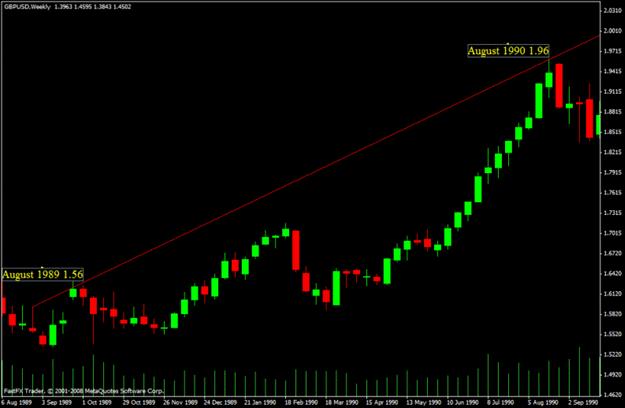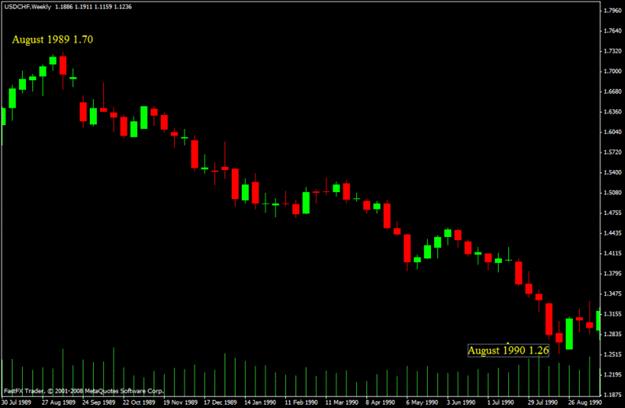Is Trillion the New Billion?
How much is a lot of money? If you asked the average American if a million dollars was an unfathomable fortune what would the response be? It depends on when you asked.
Today I would be shocked if more than 25% of Americans thought a million dollars was a fortune that one could not only sustain their family but generations to come. If the same question was asked in 1989, I believe 75% of Americans would say their children and grandchildren could live comfortably on that sum of money.
On March 18th, 2009, the Federal Reserve Bank announced a $1.2 Trillion program aimed to buy government debt and mortgage backed securities. This is on top of the $30 billion Bear Stearns loan, the $180 billion AIG bailout (so far…), the $200 billion Fannie/Freddie bailout and the $700 Billion bank bailout bill (TARP).
Notice a pattern? When the last Banking crisis hit in the late 80s the Government stepped in and authorized nearly $300 billion to bailout failing S&Ls. That sum is comparable to the .2 figure in the $1.2 Trillion announced this week. The question one must ask is, can the government inject massive amounts of cash into the financial system and still control inflation? For the answer to this question let’s look at the value of the dollar compared to other world currencies during these periods.
In June of 1989 it cost $1.56 to buy 1 Great British Pound. By August of 1990 it cost $1.96 to buy 1 GBP, about a 25% devaluation of the U.S. dollar in 14 months. Similar currency devaluation took place against the Swiss Franc. In August of 1989 it cost 1.70 Francs to buy a buck by August of 1990 it cost only 1.26 francs also about a 25% devaluation. The $300 billion FIRREA (Financial Institutions Reform, Recovery and Enforcement Act) was signed into law on August 9, 1989 and about a year later the dollar was worth about 25% less compared to other major currencies. The U.S. dollar has been the reserve currency of the world for quite some time because people believe that the U.S. economy is the strongest in the world and that although in the short term the value of the dollar is volatile, over the long run the greenback will hold its value more than the Euro, the Pound Sterling or even Gold.
The Inflation effect:
It is a simple rule of economics, if supply increases and demand remains the same, price/value falls. The U.S. government has increased the money supply dramatically and the demand for dollars has fallen. What does this mean for the buck? The Fed has a limited number of tools at their disposal to regulate inflation. Obviously the machine gun in the Feds arsenal is the ability to raise short term interest rates.
Raising rates makes currency more valuable. A country with low interest rates is viewed as a lender. Over the past 30 years, Japan has been the lender of the world, need some cheap money? Borrow some Yen. The dollar is in danger of becoming the new Yen. The Fed is sending a mixed message by encouraging people to save but keeping interest rates so low that even moderate inflation would wipe out savings. The Fed faces a serious catch 22. Keep rates too low too long and risk uncontrollable credit… again, or raise interest rates at the expense of sending the stock market tumbling. What is the Fed to do? The answer will have a big effect on not only the U.S. but the global economy as a whole.
The China Factor:
One factor in the Fed’s recent decision to buy U.S. long term debt must have been affected by the news out of Beijing. The Chinese Premier has publicly stated his concern about U.S. Government spending. Not a good sign, when your main financier is questioning the safety of their investment, immediate action is required. The timing of the announcement is interesting. Many see China’s public concern as a direct retaliation against the Obama Administration’s “Buy American” plea to U.S. consumers and “Retain American” plea to business. Because China is so heavily invested in U.S. Government debt, and the main buyer of Chinese exports is still the U.S., what’s good for the U.S. is good for china.
However it doesn’t always have to be like this. If the U.S. stops consuming Chinese products and China diversifies why would China continue to invest in America? More importantly what would it mean for the U.S. if China even slows it purchasing of treasuries? The answers are not pretty. How are we going to pay back all this money the Government is spending? The classic response is higher taxes. That is the sad prospect that each and every bailout holds, the money has to come from somewhere, and it is not coming out of the Federal budget, it is coming from tax payers. Eventually this debt must be repaid, and more than likely with quite a bit of interest.
What does all this mean for the dollar? Putting your life savings under the mattress will not work in the coming years if rapid inflation occurs. Putting your money into treasuries at these yields is effectively the same. How about gold? Gold could see a sharp increase in the next 6-18 months as investors come to terms with the fact that the dollar cannot possibly hold its buying power with the Government spending a Trillion dollars a week. The question we have to ask, is what will hold its value if not the dollar? Historically the answer has been commodities. Classic examples are precious metals such as gold and platinum, grains and softs that can feed families, and energies that can power cars and heat homes. Are we primed for another commodity run? It seems the underlying factors are in place.
Resolutions
Is serious inflation avoidable? Are we facing a Weimar Republic situation? Huge unemployment coupled with hyper inflation? Thankfully the answer appears to be no. The Fed has stated publically it will do anything and everything to stave off a depression. Will there be a period of inflation? This seems to be unavoidable. Too much capital introduced into the system in such a short period of time. The U.S. economy has some serious challenges ahead; however, for better or worse, this crisis is worldwide and effecting both industrialized and emerging markets alike.
All the fundamental factors that made America the strongest economy in the world still exist. An innovative, hard working middle class and the greatest economic engine ever created. We also have the benefit of a growing population to absorb some of the impact of the coming wave of inflation.
Tough times are inevitable, how tough and how long are questions that depend on how the Government is able to handle inflation stabilize the housing market, and more importantly create new jobs through new industry. The Government needs to work closely with business, not against it. Although there were some companies and individuals that egregiously took advantage of people for an opportunity to make a lot of money through less than ethical means, we are all in the same boat. Blaming and finger pointing will not fix the problem.
There will be a time to look back and if necessary pursue civil or criminal litigation against CEOs or companies as a whole. The focus needs to be on stabilizing employment and getting people back to work. If people don’t have income, low mortgage rates are irrelevant. This problem wasn’t created in a day and it won’t be fixed in a day, it will take hard work, intelligence, planning and foresight. But we will emerge a stronger more fiscally responsible nation ready to take on new challenges and new opportunities.

Pound Sterling against the U.S. Dollar Weekly Bars August 1989-August 1990

Swiss Franc against the U.S. Dollar Weekly Bars August 1989-August 1990
Disclaimer: FastBrokers’ market commentary is provided for information purposes only and under no circumstances should be regarded neither as an investment advice nor as a solicitation or an offer to sell/buy any financial product. FastBrokers assumes no responsibility or liability from gains or losses incurred by the information herein contained.
Risk Disclosure: There is a substantial risk of loss in trading futures and foreign exchange. Please carefully review all risk disclosure documents before opening an account as these financial instruments are not appropriate for all investors.
Jesse Richards is a Series 3 registered Commodities Futures Broker. Before getting his license, Jesse was a full time e-mini and stock options trader. He has spent time with a major U.K hedge fund and currently works for FastBrokers, a California based online Futures and Forex brokerage. For more information about FastBrokers please visit www.fastbrokers.com/index.php?JR750.
Just released! Leveraged ETF PowerRatings ranks Leveraged ETFs on a high probability 1-10 ratings scale. Click here to get your free trial now.
